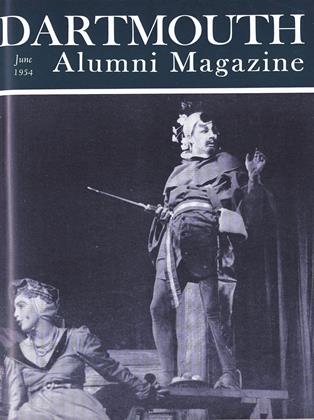By Charles TylerProuty '31. New Haven: Yale UniversityPress, 1954. 157 pp. $4.00.
Until well into the present century most scholars held the opinion that the Folio text of 2 Henry VI was a revision by Shakespeare of The First Part of the Contention Betwixtthe Two Famous Houses of York and Lancaster, a drama published anonymously in quarto form in 1594 but apparently written earlier. During the last twenty-five years, however, the view has generally obtained that the Contention is a pirated report of a heavily cut version of 2 Henry VI, reconstructed from memory by two or more actors in Pembroke's Company of players.
In the present volume Professor Prouty makes a detailed comparison of these two texts and offers very convincing evidence that the position taken by the earlier critics is the correct one. He bases his evidence on a careful and thorough study of the two versions in the matters of variations of playing, of style (especially the use of imagery and the skill in handling blank verse rhythms), and of character and structure.
The determination of this problem is particularly important for the implications to be drawn from it as to Shakespeare's development as a dramatic artist. Did he, very early in his career, write original plays dealing with English history, or was he at that period engaged in revising old plays that had already proved popular? Professor Prouty is to be congratulated for having made a noteworthy contribution to the critical material upon which any convincing answer is to be founded.
However fully the reader may be persuaded by the arguments here set forth, he cannot, nevertheless, consider the question settled with finality, for it is one of those for which, as Kittredge used to say, nothing short of revelation can provide the complete answer. Undoubtedly critical scholars who hold the opposite view will attack Professor Prouty with vigor, for they are strenuous partisans, but they will have a harder task to refute his position than they have had with any previous work dealing with this particular subject.
 View Full Issue
View Full Issue
More From This Issue
-
 Feature
FeatureTHE EXPERIMENTAL THEATRE
June 1954 By HENRY B. WILLIAMS -
 Feature
FeatureNature Conditions Architecture
June 1954 By EDGAR H. HUNTER JR. '38, -
 Class Notes
Class Notes1918
June 1954 By ERNEST H. EARLEY, RICHARD A. HOLTON -
 Class Notes
Class Notes1926
June 1954 By HERBERT H. HARWOOD, ANDREW J. O'CONNOR, Richard Eberhart '26 -
 Article
ArticleThe Faculty
June 1954 By HAROLD L. BOND '42 -
 Class Notes
Class Notes1905
June 1954 By GEORGE W. PUTNAM, FLETCHER A. HATCH
FRANCIS L. CHILDS '06
-
 Books
BooksFLASHING WINGS
November 1941 By Francis L. Childs '06 -
 Article
ArticleGreatest Of All Dartmouth Reunions
June 1943 By Francis L. Childs '06 -
 Books
BooksGRANITE LEDGES
June 1943 By Francis L. Childs '06 -
 Books
BooksTHE WATERVILLE VALLEY, A STORY OF A RESORT IN THE NEW HAMPSHIRE MOUNTAINS
November 1952 By Francis L. Childs '06 -
 Books
BooksLITERARY MASTERPIECES OF THE WESTERN WORLD
October 1953 By FRANCIS L. CHILDS '06 -
 Books
BooksTHE NOBLER RISK AND OTHER SERMONS OF AMBROSE WHITE VERNON.
March 1956 By FRANCIS L. CHILDS '06
Books
-
 Books
BooksAlumni Articles
JUNE 1966 -
 Books
BooksTHE SEVEN LADY GODIVAS
January 1940 By Dr. Seuss -
 Books
BooksThe Book That Changed My Life
JULY | AUGUST 2018 By GEORGE M. SPENCER -
 Books
BooksSONG and IDEA
March 1941 By John Holmes. -
 Books
BooksA PASSPORT SECRETLY GREEN.
December 1961 By JOHN HURD '21 -
 Books
BooksTHE LIFE SCIENCE LIBRARY BOOK OF MATHEMATICS.
MAY 1964 By WILLIAM E. SLESNICK

